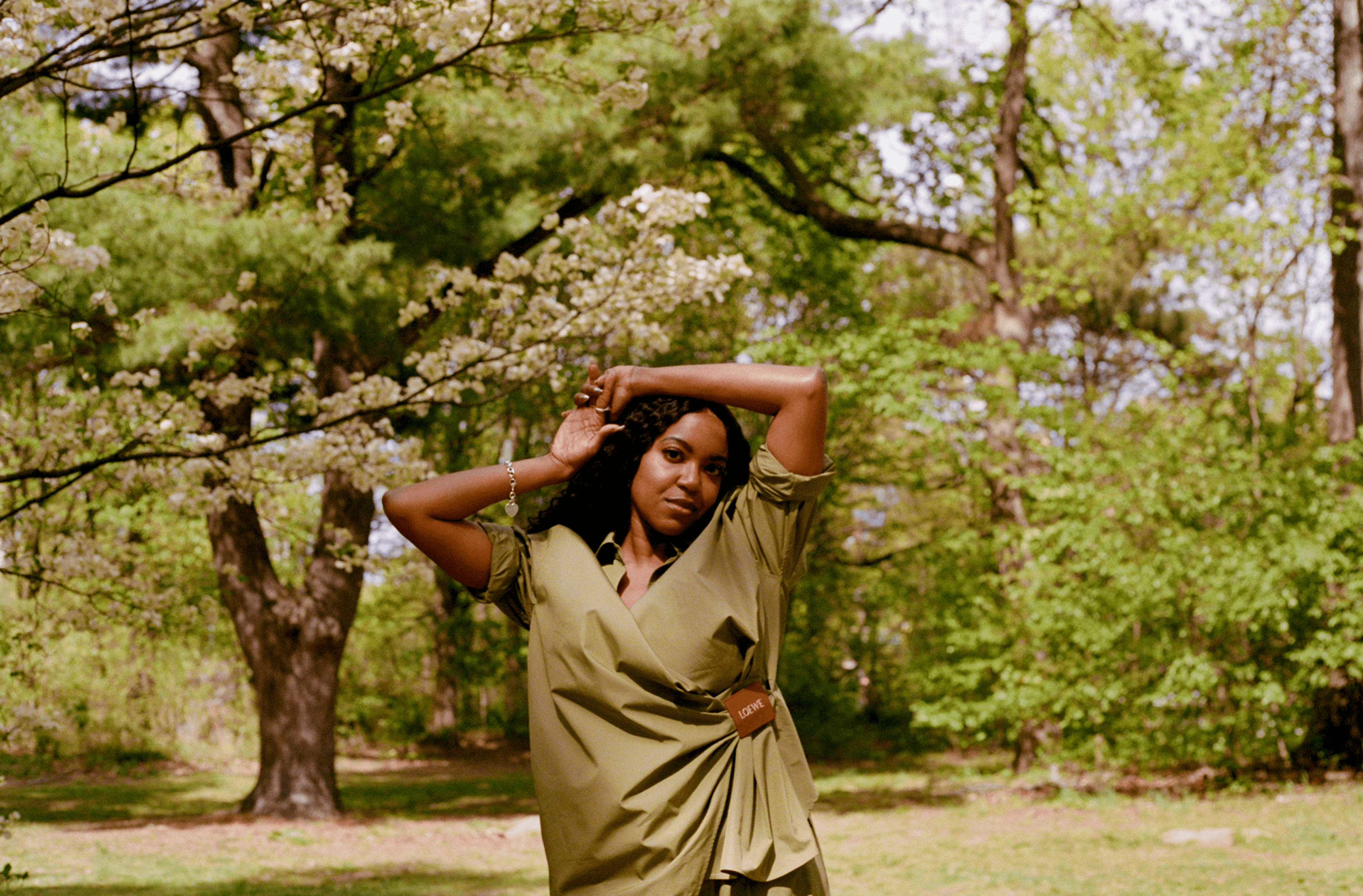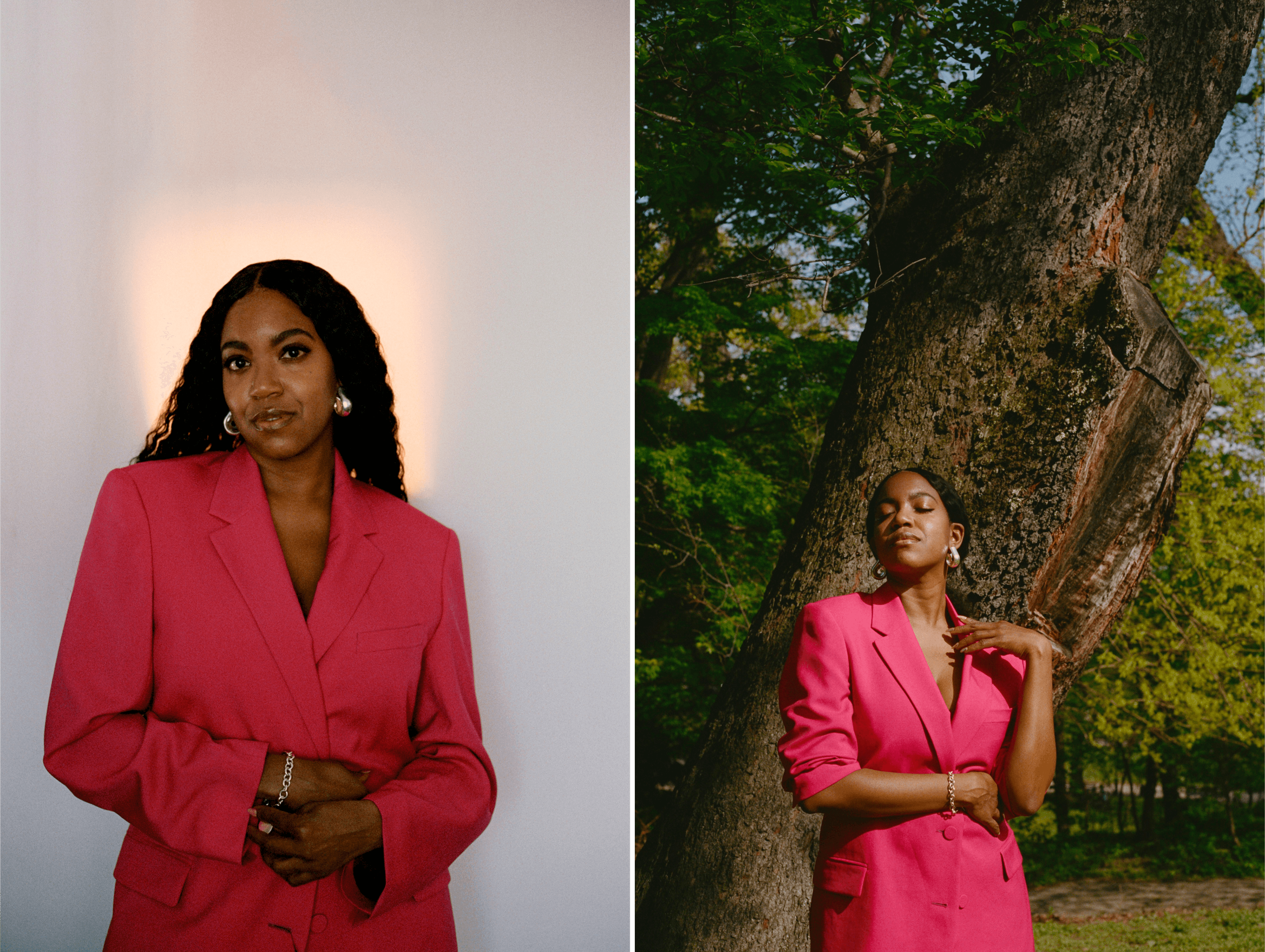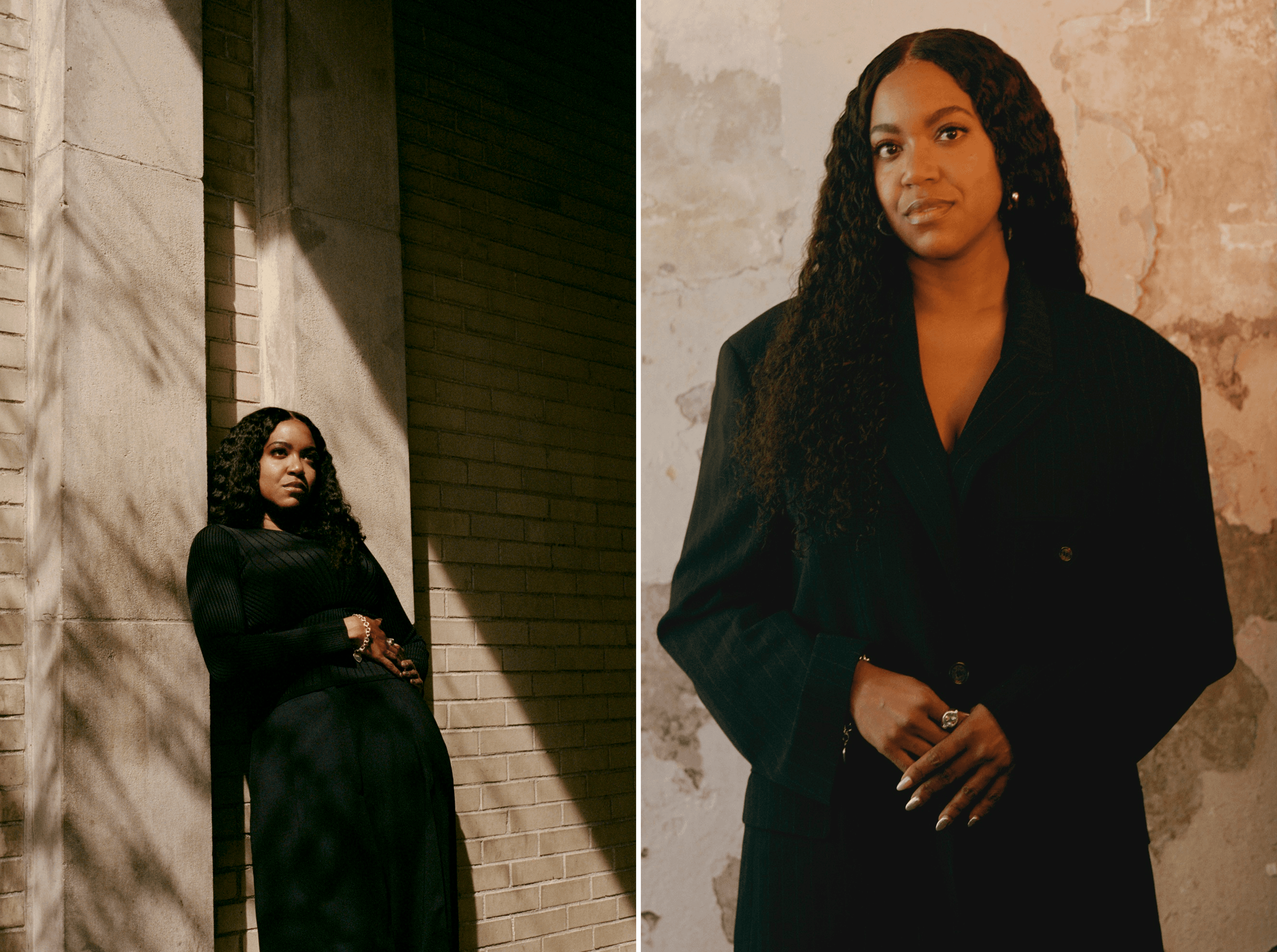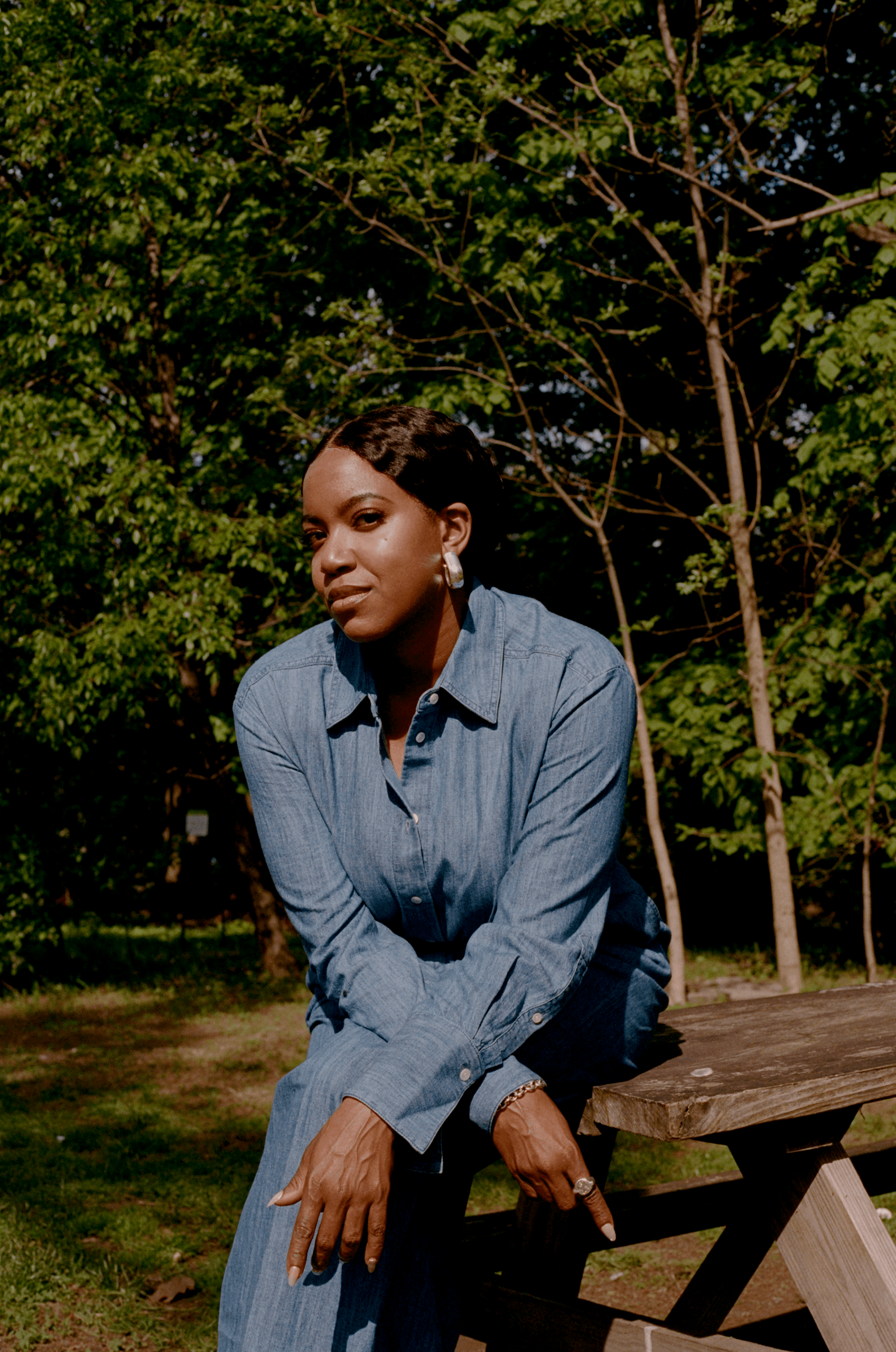
All CLOTHING by Loewe. BRACELET, worn throughout, White’s own.
Whitney White’s Infinite Visions
If anyone in New York theater deserves a postseason vacation, it’s Whitney White. Having earned a Tony nomination for her first Broadway directing job last season—for an ensemble comedy that could not have been more different than the moody sci-fi parable or the acerbic workplace satire she also staged that year—White dominated the spring of 2025 with a play and two musicals, one of which she’d written and performed in herself. On the year’s first False Summer day in April, she pulled up to an outdoor cafe near the Brooklyn Academy of Music, where her piece Macbeth in Stride was in performance for a few weeks: “Pray for me, girl.”
White’s immediate presence goes beyond disarming, straight into inviting, and is often alluringly conspiratorial. Though she’s made her name as a director, the first thing my friend said upon leaving Macbeth, her concert-style musical exploration of the Shakespeare play’s female ambition, was the hopeful gambit, “Whitney White, don’t leave the stage challenge.”
White wrote the one-act piece to explore the double-edged sword of women’s ambition in the Western canon, with a semi-autobiographical lead stepping into Lady Macbeth’s bloodied shoes, backed by a backup band of “witches” on original R&B numbers. The first of a four-part series exploring Shakespeare’s women, it re-opened the American Repertory Theater in Cambridge after its pandemic lockdown, though White had been shopping around earlier versions for years. “I think the proposition of a woman, a Black woman, interrogating Shakespeare through music is still something that people don’t know if they want to take a bet on,” she says.

All CLOTHING by Dries Van Noten. All EARRINGS throughout by Uncommon Matters.
Performing, for her, is a “crazy, sensory-based experience,” intense and “almost orgasmic.” It was also her first love, growing up in Chicago and eventually studying musical theater (and political science) at Northwestern. She booked roles in Passing Strange and did summer stock productions of Show Boat and Hair alongside Marisha Wallace, but it was being cast in a production of the 1980 British comedic play Educating Rita, of all things, that rerouted her career. She felt an emotional connection with the character, a woman striving to advance her life prospects, but felt she was missing the embodied training (the stamina, the voice) of a true actor, and applied to Brown University’s graduate acting program. There, combined with her budding desire to tell her own stories, or at least in her own way, she became drawn to directing. (If ever there were a musical adaptation of that very English play, White says she’d cast Meghan thee Stallion, who she says is “so in her body it’s, like, radical.”)
“It feels like speaking two languages and I have to speak both to survive,” is how White describes the duality of performing and directing, which she says quiets her mind. In ten years of living and working in New York, White has directed a number of pieces—mostly bold new works from rising playwrights whose premieres are already spoken of in, “Oh, did you not see…?” boastful remembrance.
She says she takes directing jobs when scripts cause her to have a physical reaction. With Jaja’s African Hair Braiding, which nabbed her that first Tony nomination, she could smell the salon’s beauty products and hear its music. Bess Wohl’s new play Liberation, which interrogates a women’s consciousness raising group in the seventies, made her feel like she was in a room with her grandmother again. As for Jordans, a cutthroat satire about race in the workplace with an ending to rival that of Hamlet? She laughs and rolls her eyes in a way that’s something of her signature: playful (for her conversation partner) and decadent (for herself, indulging the thought), with a sort of, I can’t believe I’m saying this, instant vibe-check. “God, I’ve had so many rage fantasies like that one.”
Ife Olujobi’s Jordans, which ran at the Public Theater last spring, was her first time staging nudity and physical intimacy, an experience which led to Liberation’s bold act two opener, in which its cast performs nude. White says directing an intergenerational ensemble through such material doesn’t intimidate her, crediting intimacy coordinators and an openness to working with her actors. Back in her performing days, the artistic director of a musical looked at her half-naked body from behind during rehearsal and said, “Wow, not a bad day at work.“ She says, “I’m trying to just make them have a better experience than I had, you know?”
Walden, about two sisters (played by Emmy Rossum and Zoë Winters) getting by in a near-future environmental hellscape, and the final show at Second Stage’s Kiser Theater last fall, scratched her sci-fi itch. It takes place in a world where air toxicity on Earth has advanced space colonization, but White saw it as “a story about family and reproduction versus ambition. I think that word has been the overarching theme of all my shows.”

LEFT: TOP by Mugler. PANTS by COS. RING, worn throughout, White’s own. RIGHT: All CLOTHING by Acne Studios.
Ambition is a key driver of The Last Five Years, Jason Robert Brown’s tough-to-crack cult musical from 2001, which White finally brought to Broadway this year, starring Adrienne Warren and Nick Jonas. She saw its premiere at Chicago’s Northlight Theater, and its time-hopping story about a couple’s at-odds battles with artistic success and failure stayed with her as she navigated those hills herself. (“I’ve certainly been a Cathy—I’ve done summer stock in Ohio—but weirdly, maybe now I’m having a Jamie moment.”) The production opened the same night that Liberation, which she also calls a time-travel piece, closed Off-Broadway. The near-concurrent works received wildly diverging reactions, but Liberation earned her Drama Desk and Drama League noms and, under her direction, a Best Ensemble win from the New York Drama Critics’ Circle. The Drama League also awarded White a prize for all-around Excellence in Directing.
So, I tease, why return to Shakespeare, when there’s all this new work to explore?
“Real talk, I think every rom-com we see is a permutation of Twelfth Night or The Taming of the Shrew. Every tragic love story is Romeo and Juliet or Troilus and Cressida, and every action movie is Henry V. If we’re still repeating these core stories, we’ve got to be involved with them. Maybe I’m naive, but if we don’t interrogate history, how can we go anywhere new? I went to see Othello recently and, outside of the racial and gendered elements of it, the last line before a character kills himself deals with conflict in the Middle East. That shouldn’t be so relevant, but until it’s not, I’m going to get up in there with the Shakespeare because it helps me understand this weird world we’ve inherited.”
The remaining three works in the series are done; the next sees her character, named Woman, trying out different styles of womanhood after her failed ploy at Lady Macbeth. First, it’s Othello’s Emelia (“a regular-degular girl”) informed by a grungier blues-rock sound, then the ingénue’s innocence of Juliet, scored by indie pop. “Then she says, ‘Screw it, “Now is the winter of our discontent,”’” and gender-swaps into Richard III (musically, “everything I got”). White hopes a Princeton student’s recent thesis production of Macbeth in Stride is a sign of spreading interest in her project. “I pray it’s like a wildfire that people do all over.”
Before heading back into the Brooklyn Academy for another evening’s performance, White feels invigorated by both the prospect of going onstage and the notion that the season would soon wrap. She froze Liberation (i.e. ironed out all kinks prior to its official opening) two days before Years rehearsals began, and further edits to make sure Macbeth “had enough teeth” made her feel, she says, like she was training for a triathlon. “But you’ve got to show up. You have to show up for your community.” Her dedication mirrors a way she’d earlier described her interest in deconstructing Shakespeare, in making her way into and through an often unforgiving industry: “The balance between love and power. If you’re a little too ambitious for either, things don’t go too well for you in these plays, and that’s kind of the tea. Why is that, and can I change that? I’m probably not powerful enough to change that, but I think the piece is a juicy question for the next person who might be able to answer.”
The Last Five Years continues through June 22 at the Hudson Theatre, New York.

All CLOTHING by Another Tomorrow. BELT, stylist’s own.
As a nonprofit arts and culture publication dedicated to educating, inspiring, and uplifting creatives, Cero Magazine depends on your donations to create stories like these. Please support our work here.






